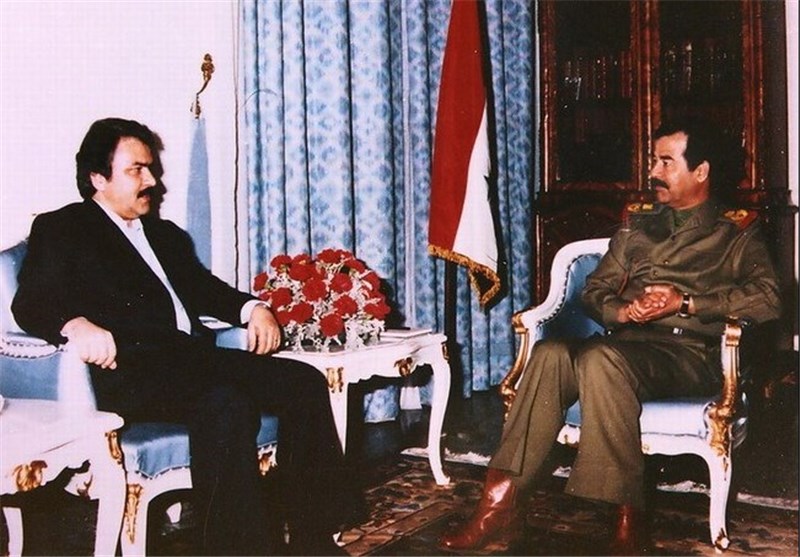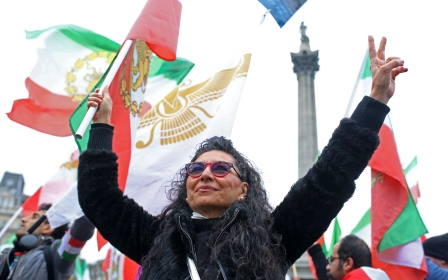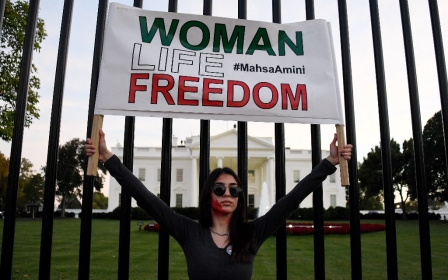How the son of Iran's last shah became a pro-Israel stooge

What in the world was Reza Pahlavi doing in Israel, of all places?
Who in the world is Reza Pahlavi, anyway, you may first wonder. Allow me to indulge.
Reza Pahlavi, 62, is the eldest son of Mohammad Reza Pahlavi, the former Shah of Iran, and once upon a time the heir-apparent and crown prince of the Pahlavi dynasty (1926-1979) before it was toppled by a massive popular revolution during the 1977-1979 uprising.
After their dynasty collapsed and his royal father passed away in 1980 and was buried in Cairo, Egypt, then the Crown Prince Pahlavi and his family moved to the United States.
New MEE newsletter: Jerusalem Dispatch
Sign up to get the latest insights and analysis on Israel-Palestine, alongside Turkey Unpacked and other MEE newsletters
Pahlavi has been sporadically in the news for denouncing the Islamic Republic.
Since the Mahsa Amini uprising, Pahlavi and a platoon of militant monarchists have sought to recast him as a leader of this 'revolution'
But over the past year, since the outburst of the grassroots Mahsa Amini (Zhina) uprising, Pahlavi and a platoon of militant monarchists have sought to recast him as a leader of this "revolution" as they wish to call it.
It is in that presumed capacity that Pahlavi has now resurfaced as a born-again Zionist and rebranded himself as a contender in any political scenario that might unfold should the protesters demand the collapse of the Islamic Republic and there be a power vacuum.
Pahlavi and his wife, Yasmine, have been gallivanting around Israel - reason and sanity even in his own interests be damned - to promote the cause of "leading" the uprising.
An 'American politician'
Those who advised Pahlavi to go to Israel seem to know nothing about the nature and history of Iranian anti-colonial nationalism.
The picture of Pahlavi standing next to Israeli Prime Minister Benjamin Netanyahu is worse than the picture of Massoud Rajavi, the Mojahedin-e Khalq (MEK) leader, sitting on expensive (but still gaudy) armchairs next to Saddam Hussein as he was waging war against Iran.
What is most peculiar about this whole spectacle, and thus the inanity of his visit to Israel, is the fact that in this new gestation, the former crown prince looks like an American politician - say a used-car salesman from Kalamazoo, Michigan, or better yet from one of Florida's congressional districts - who wishes to run for office and some pollster has told him that there is a serious pro-Israel contingency in his district and that he'd better make a quick visit to Israel and take advantage of some lovely photo ops with "Bibi".
After Israel, Pahlavi wasted no time flying to Italy and visiting the Vatican. Again, it was nothing remotely resembling a state visit, for he is the son of a deposed monarch from about half-a-century ago with no claim to any sovereign country.
What are we to make of the current unrest in Iran if this Pahlavi and his Zionist enablers have a claim on leading it? Nothing, really, or very little.
Today, too, we must make a clear distinction between the Zhina uprising by masses of millions of Iranians and the outdated hacks like Reza Pahlavi or Maryam Rajavi or Massih Alinejad falsely projecting themselves as its leaders.
They are no such things.
There is, to be sure, a profound nostalgia for the late shah, but these sentiments are not at the heart of this uprising that has had its own logic and basis, and has shaken the Islamic Republic to its foundations.
Tempest in a teapot
Neither Israel nor, in fact, Palestine is an important issue in this current uprising. There are enduring and profound roots in a sustained course of solidarity with the Palestinians in Iran going back to 1948 and the Nakba because of its own anti-colonial struggles that long predate the establishment of the settler colony of Israel and the dispossession of Palestinians - and yet there are also those who so detest the ruling regime in Iran that they extend that hatred to places like Palestine, Lebanon, Syria, or Yemen where the ruling regime has expanded its theatre of operation.
Pahlavi is taken for a ride by his Zionist handlers, who snap his photo at the Wailing Wall (a perfectly fine thing to do), when, as a Muslim, he fails even to look up to see where Haram al-Sharif is located - where the Israeli police savagely attacked praying Palestinians just days before.
He is a Muslim - named after the Eighth Shi'i Imam - and he has a claim to leading a Muslim country to freedom. At the time when even millions of liberal Zionists are out in the streets against the endemic fascism in their settler colony, this Johnny-come-lately decides to have his pictures twice taken with "Bibi".
The problem with Pahlavi is that he is a banal and cliched American politician in search of a royal prototype. His father was toppled after a historic revolution at the prime of the son being groomed as the next Persian monarch. But that did not happen, and he has spent his entire adult life in exile from his homeland, for much of which he has had a private and mostly happy life - though marked by the tragedy of two of his siblings committing suicide.
It would be instructive to compare him to his father and grandfather who, too, were forced into exile - one by the Allied forces in 1941 because of his affinity for the Nazis and the other in 1979 by a massive popular revolution.
Does Pahlavi really think that history will repeat itself and the US, UK, and this time, aided by Israel, will stage yet another coup and bring him to power?
Before that revolution drove his father out, and while waiting, in 1953, for the CIA and MI6 to stage a lively little military coup to bring him back to power, Mohammad Reza Shah acted like an exiled king while enjoying his vacation in Rome with his lovely wife, Soraya. The coup was successfully staged, and the young monarch happily returned to power and resumed being a king. But not so his son, who has come to political maturity in the American politics of careerism and showmanship, of which Donald Trump is a prime example.
Does he really think that history will repeat itself and the US, UK, and this time aided by Israel, will stage yet another coup and bring him to power?
Far away from this pitiful tempest in a teapot, we need to distinguish among a number of conflated facts and factors here: the ruling Islamist regime in Iran has from its very birth been detested by significant parts of the population they wish to rule, especially in poverty-stricken areas like Sistan and Baluchistan or Iranian Kurdistan, and the victims of rampant corruption and elitism in the Islamic Republic; (2) the current legitimate revolt known as Zhina uprising is based on deep-rooted economic, social and political conditions; and (3) there is a freak show of expat opposition forces like the monarchists, US-Israel, and, until recently, Saudi-sponsored regime changers like the MEK.
As for Reza Pahlavi, he is better off moving to Florida, or better yet to Los Angeles, or any other heavily Maga-infested district, and running for US Congress on the coat-tails of Donald Trump. His chances are much stronger there than regaining his peacock throne any time soon.
The views expressed in this article belong to the author and do not necessarily reflect the editorial policy of Middle East Eye.
Middle East Eye delivers independent and unrivalled coverage and analysis of the Middle East, North Africa and beyond. To learn more about republishing this content and the associated fees, please fill out this form. More about MEE can be found here.






